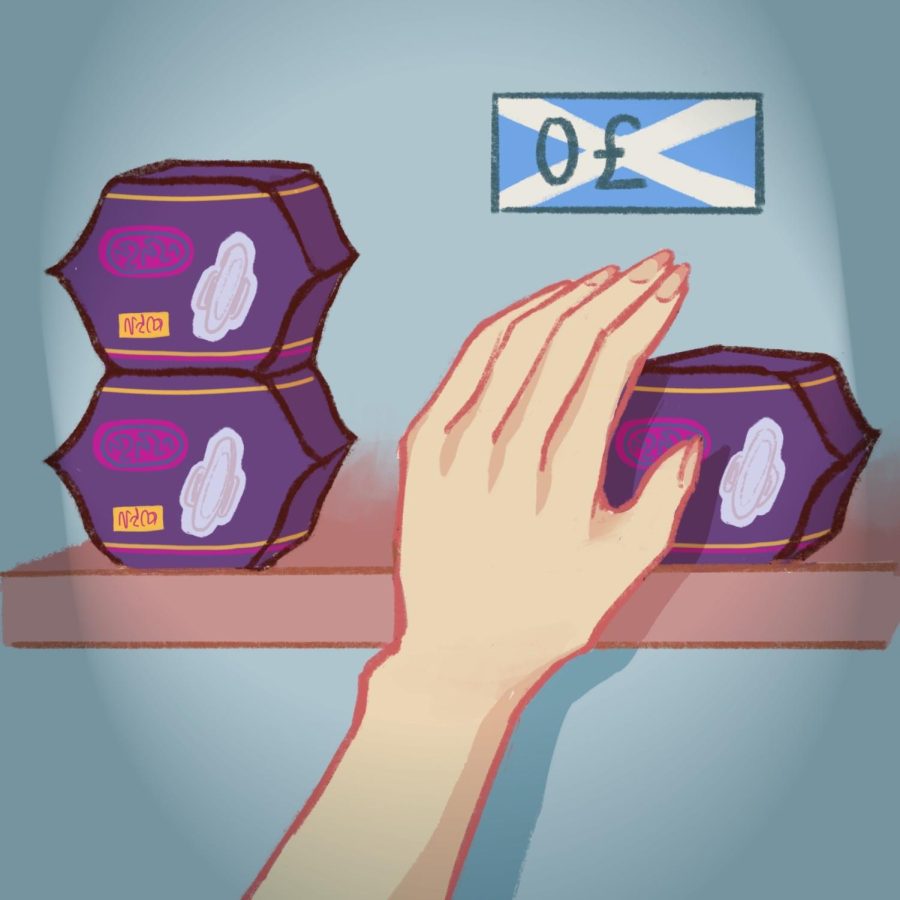Scotland: The First Country to Make Period Products Free
October 7, 2022
A new law in Scotland is going to change the lives of many citizens. Scotland’s legislation passed a bill on Nov. 21, 2020, and was issued on Jan. 12, 2021, making period products free all over the country. They made this law to help with the rising problem of period poverty in Scotland. An article by ABC News addresses what this life-changing bill promises, stating, “Under the new law, schools, colleges and universities, as well as local government bodies must make a range of period products such as tampons and sanitary pads available for free in their bathrooms. The Scottish government already invested millions of pounds since 2017 to fund free period products in educational institutions, but the law makes it a legal requirement.”
If this law was more publicized it would have made a big impact back in 2020. Sadly, most, if not all, people are not aware of this new bill. Junior Kayla Tehero, the vice president of the IHS Feminism Club, mentioned,” The U.S. should have this law too.” This leads to the question of if this would affect the economy. Currently there is a tax on feminine hygiene products causing period products to range anywhere from $6 to $20.This tax negatively affects many people suffering from period poverty. According to CNN, one of Scotland’s legislators states,” It was reasonable to expect 20% of the menstruating population to make use of the program, given that official inequality statistics show that nearly 20% of women in Scotland live in relative poverty.” Another article by The New York Times adds, “When the bill was drafted, Ms. Lennon and the bill’s other writers said they kept in mind challenges to menstruation for those experiencing poverty, homelessness, abusive relationships and health conditions.”
Like many schools in the U.S, Issaquah High School supplies tampons in the girls’ bathrooms as well as pads and tampons in the female locker rooms, but does this have a positive impact? Freshman Shaela Delabarre says, “I think so. I think it is a good idea just because some people do not have the resources to buy them.” Senior Evelyn Estrin agrees but states a sad truth that they are not the best quality and sometimes do not get refilled for multiple days. According to BBC News, “Since it launched the scheme, another Young Scot survey found that two-thirds of respondents had received free period products from their school, college or university in the past year.”
Would this work in the U.S.? Sophomore Sole Miller and Estrin have two different views on if this bill would cause issues if we supplied free period products. Miller says, “Yes because there is a period economy.” Evelyn disagrees, stating, “It should not. I do not see why it would because it is helping women.” Some articles surrounding these issues said that this bill could cause an unhealthy view on women’s health and affect the stigma against periods. BBC News states,” Of those who accessed the free products, 84% said the scheme had a positive impact on them.” That means that 84 percent of the 2.798 million women in Scotland have already been assisted with this new law.
Now that the bill has passed, one region in Scotland wanted to have a “Period Dignity Officer” whose job would be to pass out these products and make sure they are refilled every time they run out for which they chose a man. The New York Times shows the perspective of Scotland’s citizens after this decision: “The appointment of Jason Grant, a former personal trainer, as the coordinator of the menstruation dignity plan in Scotland’s Tayside region, north of Edinburgh, led to bewilderment and widespread criticism. On Monday, the role was scrapped.” Scotland’s citizens were displeased by the news and began to say, “Men can support women’s rights without having to lead it.” When asked if She agreed with this statement, Tehero points out that any positive progress is beneficial.
If Scotland had appointed a woman for this new role, it would have brought more positive attention to this ground-breaking new law especially from the global female population not just women in Scotland. Even with a man having the role, women all around the world were excited to hear about the new freedom in Scotland. Tehero states, “Periods products should be given for free because they are a necessity and women need them on a day-to-day basis.” People should not be grossed out by periods or ashamed of theirs because women cannot control it. Currently the world is still split on if this was a good decision or if it was a way for men in government to have another way to control women’s bodies. This article to show how the other parts of the world have progressed with bills and rights for women. Meanwhile, the U.S has brushed that aside.






